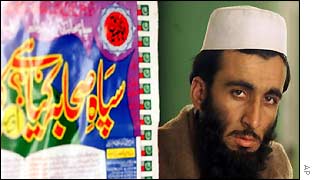| CATEGORIES | TV | RADIO | COMMUNICATE | WHERE I LIVE | INDEX | SEARCH | |||||||
|
| You are in: World: South Asia | |||||||||||||||||||||||||||||||||||||||||||||||||||||||||||||||||||||||||||||||||||||||||||||||||||||||||||||||||||||||||||||||||||||||||||||||||||||||||||||||||||||||||||||||||||||||||||||||||||||||||||||||
|
Sunday, 13 January, 2002, 21:37 GMT
Pakistan's militant Islamic groups

Majority Sunnis are often blamed for violence against Shi'as
The militant Islamic groups banned in Pakistan include two groups which have been often blamed for a stream of sectarian violence in the country. The Islamic Sunni Sipah-e-Sahaba and the Shia Tehrik-e-Jafria have been accused of attacking followers of the rival sects. President Pervez Musharraf says about 400 people were killed in the country in sectarian violence last year. Sipah-e-Sahaba Sipah-e-Sahaba or the Army of Prophet Mohammad's companions is a radical group from the majority Sunni sect of Islam.
Sipah-e-Sahaba has strongholds in southern districts of the populous central province of Punjab and the volatile port city of Karachi. Maulana Jhangvi was assassinated in a suspected sectarian attack in 1990. The killing led to the formation of a breakaway and more radical Jhangvi group which was banned last year. Sipah-e-Sahaba is now led by another cleric, Maulana Azam Tariq. Maulana Tariq was detained by the authorities in October last year at the height of violent protests by hardline Islamic groups in support of Afghanistan's Taleban regime. Tehrik-e-Jafria Tehrik-e-Jafria or the Movement of Followers of Shia Sect was founded in 1979.
The Islamic revolution in predominantly Shia Iran around the same time gave an added boost to the organisation. Its leader, Allama Arif Hussain al-Hussaini was a student of the leader of Iran's Islamic Revolution, Ayatollah Khomeini. Tanzeem-e-Nifaz Another group banned is the Tanzeem-e-Nifaz-e-Shariat-e-Mohammadi. This radical Sunni Muslim group was founded by Maulana Sufi Mohammad.
The group has been engaged in violent agitation for the enforcement of Islamic laws in its stronghold of Malakhand in northwestern Pakistan. In the late 1980s, then-Prime Minister Benazir Bhutto ordered paramilitary forces to crush a revolt by the group. In October last year, Sufi Mohammad crossed into Afghanistan with thousands of his followers to help the Taleban fight the US-led forces. But he returned soon following the collapse of the Taleban. He has since been under detention. Tit-for-Tat Attacks by rival Shia and Sunni groups intensified in 1990 with the murder of the Sipah-e-Sahaba founder, Maulana Jhangvi. This was also the year when an Iranian diplomat, Sadiq Ganji, was killed in Lahore. Thousands of people have been killed in vendetta attacks since the 1980s. |
See also:
07 Jan 02 | South Asia
04 Jan 02 | South Asia
21 Dec 01 | Americas
20 Dec 01 | South Asia
13 Dec 01 | South Asia
14 Dec 01 | South Asia
12 Jan 02 | South Asia
Internet links:
The BBC is not responsible for the content of external internet sites
Top South Asia stories now:
Links to more South Asia stories are at the foot of the page. |
|||||||||||||||||||||||||||||||||||||||||||||||||||||||||||||||||||||||||||||||||||||||||||||||||||||||||||||||||||||||||||||||||||||||||||||||||||||||||||||||||||||||||||||||||||||||||||||||||||||||||||||
Links to more South Asia stories |
 |
||
| ---------------------------------------------------------------------------------- To BBC Sport>> | To BBC Weather>> | To BBC World Service>> ---------------------------------------------------------------------------------- © MMIII | News Sources | Privacy |